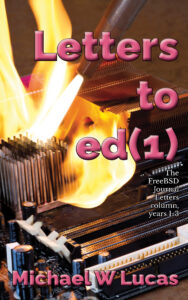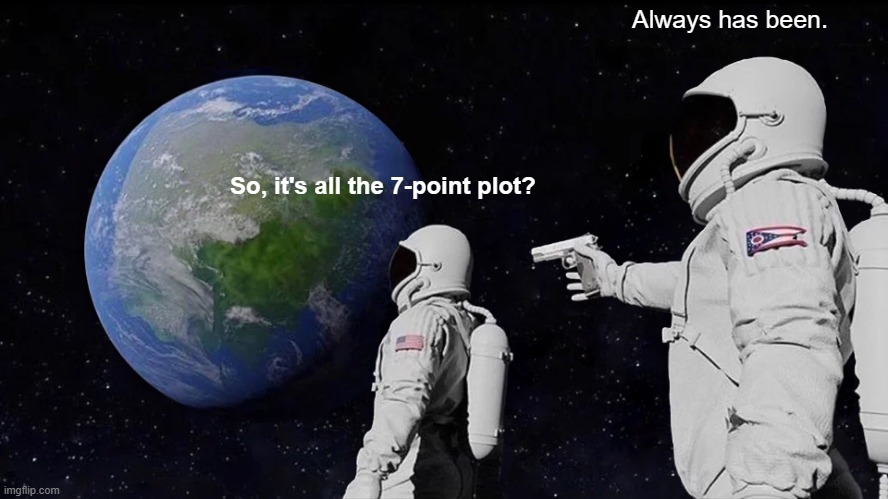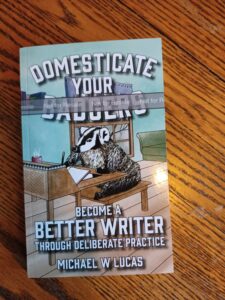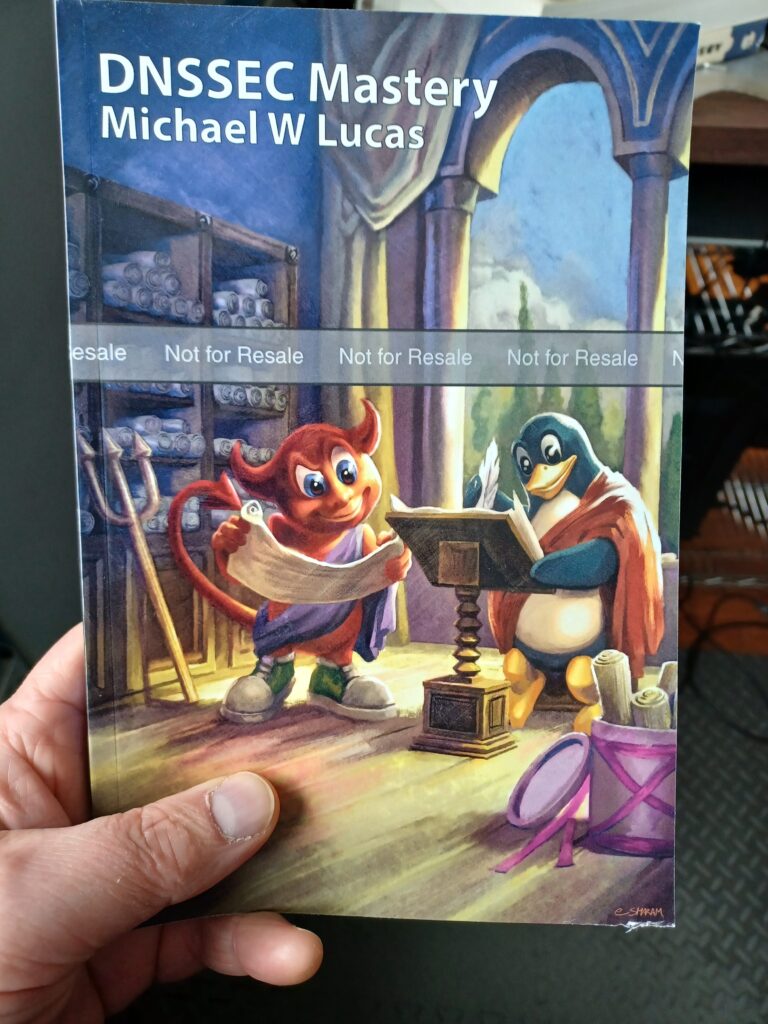The subject says the exciting bit. Now that I have shipped out the print sponsor gifts for the new DNSSEC Mastery, I can open sponsorships for the next tech book–OpenBSD Mastery: Filesystems. I expect this to be large for a Mastery book, so the e-book sponsorship is an extra five dollars. Sorry, folks, the price of gelato keeps going up. I know this isn’t real inflation, it’s the gelato oligarchs pushing for even greater profit, but a writer needs his delicious cold dairy fix.
Print sponsorship pricing hasn’t changed, except that it has. When I first started doing sponsorships several years ago, I thought that nobody would buy them. I also thought shipping costs would be negligible. How much time and money would mailing books to one or two radical fans take? I was wrong — not once, not twice, but three times simultaneously. (That’s not a record. I once managed to be wrong in five ways at once, but three is still decent.) I’m delighted and grateful that so many of you want to make it easier for me to write these books.
I’m now budgeting $10 on postage for each sponsor gift, and am asking overseas readers to pick up the overage. It costs me about $20 to ship into Canada, so those sponsorships are $110. Sorry.
Some of you have requested an option for faster shipping. That’s now a choice.
If all you want is this news, you can stop reading now.
Still here? Sorry. I’m going to talk crowdfunding for a moment.
I appreciate everyone who buys my books or supports me writing them. It doesn’t matter if you just bought one or two of my books from your favorite store, if you’ve methodically collected every word I have ever put in public, or if you send me money every month even when I released nothing. If you give me money for my work, I am grateful.
This post is not about you individual readers. It is especially not about extracting more money from individual readers. (The way to get more money from individual readers is “write more and better books.”) I’m looking at crowdfunding to expand my readership.
Today I have two crowdfunding channels. There’s my Patronizers program, both through Patreon and direct to me via my e-bookstore, where people send me money every month for no good reason. Sure, there are Patronizers levels where I send you every book I write, but it’s still a terrible deal. For every month where I released three or four books, there are several months where nothing comes out. Patronizers are the hard core Lucas Loonies.
Then there sponsorships. Sponsors, wisely, want an actual reason to send me money. If I’m writing a book that interests them, or that they believe should exist, they pay me to work on it.
Recently, I tried Kickstarter. And here is where things get complicated.
Kickstarter works, dang it. I tried it on an off–brand book, something that didn’t fit into any category I’m known for. I needed to write this book, mostly so I had something to give to people who asked about the topic, but it’s not a field I intend to become known in. I have no desire to build a career writing books about writing; I just want to write books. Don’t get me wrong, I’m proud of Domesticate Your Badgers. I think it’s a decent book. I did the best I could on it. But it’s decidedly off-brand.
Badgers also had the most successful launch of any book I’ve published independently.
Forget the $8843 Kickstarter. Forget that I had to learn how to produce freaking shipping manifests to mail the hundreds of books. It’s my best-selling title on every platform, from Amazon to my e-bookstore. In February, DYB print pre-orders outside of Amazon were greater than non-Amazon print sales of all other books combined. I am not the only author who has experienced this. I’ve talked with a bunch of them, and my working hypothesis is that Kickstarter builds word-of-mouth. I could babble on about social proof and so on, but it all boils down to word-of-mouth.
When I started the Kickstarter, I guessed that most of the backers would be people who had directly sponsored me previously. I saw several familiar names on the list of backers, but most of them were people I had never heard of. The social aspect of Kickstarter brought new readers to me. Many of them went on to pick up other books I had written. If I want to keep making a living, bringing in new readers is everything.
I need to add Kickstarter to my crowdfunding strategy.
I must also keep my Patronizers and sponsors happy. I cannot offer unreasonable benefits only for Kickstarter users, leaving early backers and longtime supporters out in the cold. I have some thoughts on how to do this, and I’m putting them out so that Patronizers, sponsors, and Kickstarter fans alike can poke holes in them.
Patronizers and sponsors get credit in books. That’s a benefit often added in a Kickstarter. I will put sponsors and Patronizers in the acknowledgments in the front of the book, and list Kickstarter supporters in the back.
Some folks support me to get signed books. Sponsors and Patronizers will get books made out to them by name. Kickstarter books, I will sign but not personalize.
Any backer – exclusive benefits will go to everyone who helped crowdfunding the book. If I hit a Kickstarter stretch goal that says I will write an exclusive article, that article will go to Kickstarter backers, book sponsors, and Patronizers alike. If a campaign hits a goal where everyone gets another book free, everyone who normally gets books will get that bonus book as well.
I use patronage and sponsorships to support me as I write the book. I will use Kickstarter funds to improve the book. I would love to have chapter header art in the Mastery books, but that has been cost-prohibitive. I would like to offer slipcases and fancy binding but, again, that’s expensive. If Kickstarter expands my readership, expensive projects become doable.
For folks who don’t want to send me a hundred dollars months ahead of time, Kickstarter will offer a more modestly-priced way to get me to sign a book and mail it to you. It’ll even have your name in it — in the back, but there.
I can’t see Kickstarter replacing either Patronizers or sponsorship. One of my business goals is disintermediation, and Kickstarter is another middleman. It’s an effective middleman so I will use it, but I will also be doing my best to convert readers who discover me through Kickstarter into sponsors and Patronizers. Will it work? Dunno. But finding out is gonna be a trip.
Before I run a Kickstarter for this book, I’ll be running a couple of small fiction Kickstarters. I need to learn more about the platform before I rely on it.
If you are a regular sponsor or Patronizer, do let me know if you have any concerns or things you’d like to see. I have many thousands of words left to write on this book, and a Kickstarter is months away at best. And with that I better go write.




